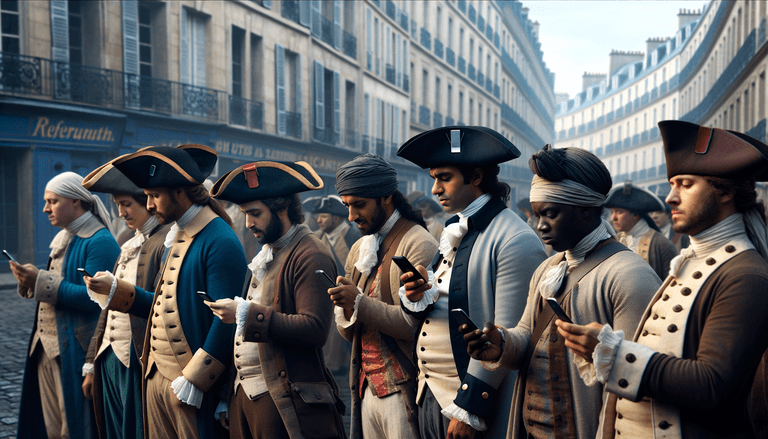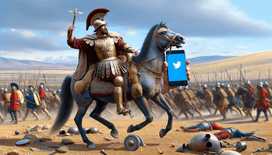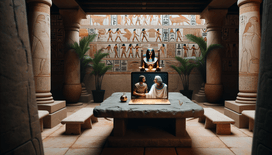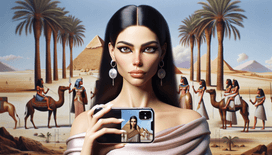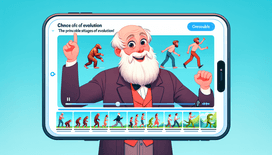A cheeky word of advice for any tech giant pondering an international expansion in the 18th century: France was the place to be. Picture revolutionaries galore armed not only with passion and frustrated warrants of bread deprivation, but also the multilingual sorcery of Google Translate. The tumultuous French Revolution would surely have unfolded with a comedic twist, spurred on by the efficiency and chaos of mistranslations and the occasional linguistic faux pas.
The Revolutionary Challenge of Communication
Let us first set the scene. The cobblestone streets of Paris resonate with the fervent cries of "Liberté, égalité, fraternité!" Yet, in a nation peppered with peasants speaking regional dialects hotter than fresh baguettes, communication was somewhat of a sucker punch to the revolution's smooth sailing dreams. The sans-culottes in Lyon may as well have been speaking in tongues to their Provence counterparts, as the uniformity of the French language had the consistency of cheese fondue.
Enter Google Translate, with its infinite expansion beyond just bonjour and croissant. Suddenly, every pamphlet, decree, and fiery speech could be disseminated in glossy, albeit machine-like prose, from the vineyards of Bordeaux to the alleys of Avignon. Robespierre might have traded his Jacobin robe for a turtleneck, striding confidently through the streets armed with translation apps, encouraging unity one misconstrued idiom at a time.
The Miscommunication Revolution
Of course, the path to utopia is never without its hiccups, and with Google Translate’s quirks, the historical domino effect was indeed dubious. It’s not hard to imagine certain pivotal moments receiving a linguistic makeover. Take, for instance, Marie Antoinette’s infamous, probably apocryphal, "Let them eat cake." With a mistranslate of "Qu'ils mangent de la brioche" to something akin to "let them eat steak," culinary riots could have ensued over an accidental suggestion of feeding parboiled petit-filet to the proletariat.
Moreover, let's remember the monumental Declaration of the Rights of Man and of the Citizen, proclaiming equality and liberty in esteemed grandeur. With Google Translate on the lens, one can envision it spawning mottos like "Rights of Man and Our Fellow Toast" or, perhaps, questioning liberty with "Freedom but Tied." A touch of translation ambiguity could ignite debates (and maybe even baguette duels) on the assembly floors in which no one quite knew if they were advocating for universal rights or just recommending a well-buttered breakfast.
The Revolutionary Social Media Machine
Armed with their linguistic ally, revolutionaries could embrace another fantastical future caboodle: multilingual hashtags. "#DownWithTheBourgeoisie" in 100 dialects, trending across imaginary 18th-century Twitter! Envision the international support flooding in, from a Hawaiian king sending emojis of pineapple-topped guillotines to gentry in Britain misunderstanding #ViveLaRévolution as "Viva Revolution," promoting an unexpected worship of Spanish nightlife.
The famed rallying of the Bastille would have taken digital flight, igniting hashtags that torched through to revolutionaries worldwide. Misreading could foster a curious alliance whereby disbanded rural guilds accidentally rekindle trade unions while attempting to post sunflower emojis, meanwhile Napoleonic groups could inadvertently find themselves pledging allegiance to a Bread Revolution, taking "yeast" very seriously.
When Technology Takes a Breather
Undoubtedly, amidst the rise of artificial linguistics, a few savvy revolutionaries may pause to question whether this new virtual lexicon aids their cause or sets it off as a grandiloquent farce. After all, there's a rich irony in proclaiming #Liberty in an era where dictation was the dust-devil of the elite.
Alas, such is the dual-edge of technology. Where Google Translate could inspire astonishing unity, it may also perplex, creating unintentional comedy that would play out across little booths and meeting halls. Yet have no doubt: the French Revolution, armed with an enterprising Google Translate, tells a story of linguistic revolution alongside its political one.
Now, as we sip our 21st-century brewed flat whites, perhaps we owe a nod to the historical did-you-knows. If not for the fictional glory of auto-translation, we could quite possibly witness a revolution with menus in hand, querying the Parisian streets with empirical accuracy but with none of the idiosyncratic excitement that characterised one of the world's most renowned upheavals.
